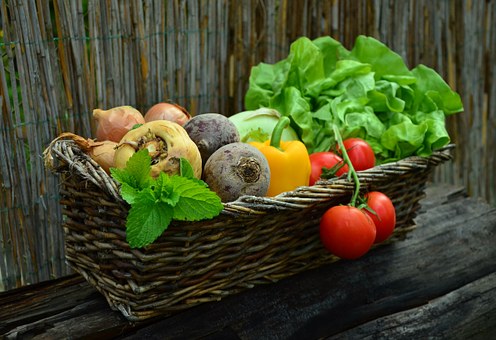Will eating organic help avoid the pesticides?
You’ve probably heard there are many benefits to eating organic, but if you’re like most people, you may still be somewhat confused about the whole “organic” thing. How is it decided on what makes something ‘organic,’ and is it really better than the regular produce? Also why is organic produce so expensive? What does eating organic even mean.
For a food to be certified organic, it must meet certain USDA criteria. For vegetables and fruits, this means the produce must be grown without using most conventional pesticides, fertilizers made with synthetic ingredients or sewage sludge, bioengineering, or ionizing radiation. There are different criteria when talking about meat.
The benefits of eating organic produce are that produce grown under organic standards have been shown to provide significantly greater amounts of powerful compounds called phytochemicals which have potent fat-fighting, age-defying, antioxidant properties while reducing exposure to potentially harmful pesticide residues, heavy metals, and antibiotic-resistant bacteria. Which means you get a lot more of the good stuff and less of the potentially harmful stuff.
Many people tend to purchase organic because they’re concerned about sustainability and to support environmentally-friendly farming practices. In terms of limiting your exposure to potentially harmful chemicals, it turns out that there are times when organic produce is even more important than others.
As far as cost is concerned, if you’re buying organic produce at a typical supermarket, then you will generally pay considerably more than the conventional versions of these same fruits and veggies, so you should learn to shop elsewhere for your organic needs. Simply stopping by your local farmers’ market is a good alternative. Health-food stores are another option, but it is a good recommendation to checking out the goings on for what’s on sale when shopping at these outlets,otherwise you will end up paying more money. Fresh, in-season, organic produce can be just as affordable, if not more so, than the regular stuff at the grocery store. And you’ll also likely notice a significant improvement in taste.
Buying in bulk can further decrease costs. Remember, produce will always be cheaper in-season, so stock up at the right time and then freeze the rest. Frozen produce can easily last months once purchased and will still taste great. Simply thaw and enjoy. This gives you the double-whammy savings of buying in-season and in larger quantities.
Consumer Reports is, on average, 47% more expensive, is really worth it. Even more importantly, most people perceive that buying organic is considerably more expensive, and studies consistently show that price, whether real or perceived, is the major obstacle holding people back from buying organic foods. It can be pretty tempting to skip the organic section altogether, especially if you’re trying to save some money. Yet the old saying is often true: You get what you pay for.
Since 1993, the Environmental Working Group, or “EWG” for short, has fought for consumers’ rights to live healthier lives in a healthy environment. Recognizing the continued use of large amounts of toxic pesticides in conventional farming, in 2004, the EWG started providing the Shopper’s Guide to Pesticides in Produce™, which ranks the 48 most popular conventional fruits and veggies, according to pesticide contamination.
The EWG refers to the most pesticide-laden produce as the Dirty Dozen, which would be best purchased organic. This is a fantastic resource for those of us who are looking to maximize the health benefits of a diet rich in fruits and vegetables while limiting our exposure to toxic pesticides.
Here’s the Dirty Dozen list for 2017:
1) Strawberries
2) Spinach
3) Nectarines
4) Apples
5) Peaches
6) Pears
7) Cherries
8) Grapes
9) Celery
10) Tomatoes
11) Sweet bell peppers
12) Potatoes
So, if you want to limit your exposure to pesticides keep this list on your phone or in your wallet.
On the other end of the spectrum, the EWG also publishes the Clean Fifteen™, which is a list of the conventional produce with few, if any, pesticide residues detected.
Here’s the Clean Fifteen List:
1) Sweet corn
2) Avocados
3) Pineapples
4) Cabbage
5) Onions
6) Sweet peas (frozen)
7) Papayas
8) Asparagus
9) Mangos
10) Eggplant
11) Honeydew melon
12) Kiwi
13) Cantaloupe
14) Cauliflower
15) Grapefruit
While it still may be better to eat organic when you can, it may not be financially feasible all the time. Use these extremely helpful lists to limit your exposure to toxic pesticides.
References
1. Smith-Spangler C, Brandeau ML, Hunter GE, et al. Are organic foods safer or healthier than conventional alternatives?: a systematic review. Ann Intern Med. 2012;157(5):348-366. doi:10.7326/0003-4819-157-5-201209040-00007.
2. Barański M, Srednicka-Tober D, Volakakis N, et al. Higher antioxidant and lower cadmium concentrations and lower incidence of pesticide residues in organically grown crops: a systematic literature review and meta-analyses. Br J Nutr. 2014;112(5):794-811. doi:10.1017/S0007114514001366.
Get Health News you can use!
Sign up for our Newsletter NOW!


